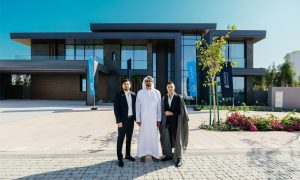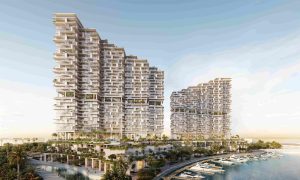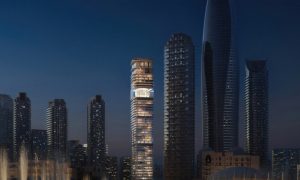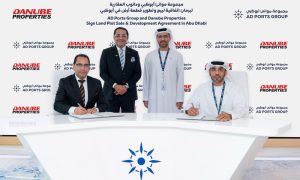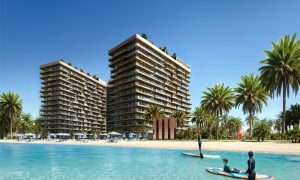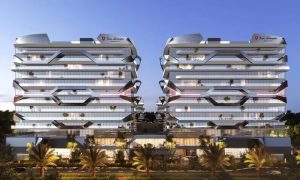Abu Dhabi launches $2.72bn drive to expand manufacturing sector to over $46bn
Six programmes will be centered around a circular economy, Industry 4.0, talent development, ecosystem enablement, developing a homegrown supply chain and value chain development

$2.72bn will be invested by the Abu Dhabi Government across six transformational programmes that are designed to more than double the size of the city’s manufacturing sector to $46.83bn by 2031. The government intends to offer increased access to financing, enhance the ease of doing business in the emirate, and is targeting greater foreign direct investment.
The new Abu Dhabi Industrial Strategy was launched by Sheikh Khaled Bin Mohamed Bin Zayed Al Nahyan, member of the Abu Dhabi Executive Council and Chairman of the Abu Dhabi Executive Office, and will strengthen the emirate’s position as the region’s most competitive industrial hub.
The strategy via the six programmes aims to create 13,600 skilled jobs with a focus on Emirati talent, and boost Abu Dhabi’s trade with international markets, with a goal to increase Abu Dhabi’s non-oil exports by 143% to $48.67bn by 2031.
Multiple initiatives, including a new circular economy regulatory framework, as well as new green policies and incentives, will help continue Abu Dhabi’s transition towards a smart, circular economy, powered by an industrial sector that champions responsible production and consumption across waste management, parts supply, and manufacturing, a statement said.

Commenting on the launch, which took place at Khalifa Industrial Free Zone (Kizad), Mohammed Ali Al Shorafa, Chairman of the Abu Dhabi Department of Economic Development (ADDED), said: “Abu Dhabi’s blueprint for a comprehensive industrial strategy is an ambitious vision that will guide the future of the emirate’s manufacturing sector, and shape a resilient and diversified economy for decades to come. In line with the UAE’s industrial strategy, Operation 300bn, our roadmap will create the ideal environment for businesses to emerge and grow. It addresses our ever-growing productivity goals, helps secure future investor opportunities, safeguards our human capital and boosts job creation, and enables us to pre-empt evolving market conditions and shifting trends.”
He added, “The Abu Dhabi Industrial Strategy, which includes plans for a smart circular economy, catalyses value creation and ensures cost competitiveness. And with the combination of Abu Dhabi’s enabling public-private partner business ecosystem and investor-friendly regulations, we are ushering in a new era of economic growth.”
Falah Mohammad Al Ahbabi, Chairman of AD Ports Group remarked, “Building upon the UAE’s ambitions to develop and enact effective economic strategies that directly impact the growth of the local economy and advance its status as a leading player in international trade and industry, Abu Dhabi’s industrialisation strategy is a tremendous initiative that reflects our wise leadership’s promise towards achieving the sustainable transformation of our economy over the next decade.”
He added, “Leveraging the full potential of innovative technologies across the UAE’s industrial landscape, while also driving the development of a robust and diverse manufacturing sector, we will be able to realise the next stage of advancement for our national economy and elevate its position as a leading global industrial power. And while the global economy remains complex and disruptive, thanks to the strategic guidance of the UAE’s leadership, Abu Dhabi’s drive for industrialisation is aligning the emirate on an upward path that is bolstering non-oil GDP growth and at the same time facilitating a fast-growing, dynamic, and job-rich logistics and manufacturing ecosystem.”

While enhancing sustainability across the ecosystem in line with the UAE Net Zero by 2050 and the National Climate Change Strategy, the manufacturing industry’s ongoing evolution will be accelerated by the integration of advanced Industry 4.0 technologies to spur growth, competitiveness and innovation.
The strategy’s iniatives will also advance the emirate’s development into a global hub for future industries, with a focus on seven targeted manufacturing sectors: chemicals, machinery, electrical power, electrical equipment, transportation, agri-foods, and pharmaceuticals.
The six transformational programmes will be centered around a circular economy, Industry 4.0, talent development, ecosystem enablement, developing a homegrown supply chain and value chain development. Alongside the launch of the strategy, several new industry partnerships were signed.
In November 2020, AGS and Veolia announced plans to set up a PET recycling plant in Kizad to boost Abu Dhabi’s circular economy drive, while in February 2022, AD Ports Group inked a deal with Ghassan Aboud Group to launch Regional Food Hub – Abu Dhabi. In June, Faithful+Gould and Woods Bagot announced plans to build the new, 29,000sqm Masdar City Square.
